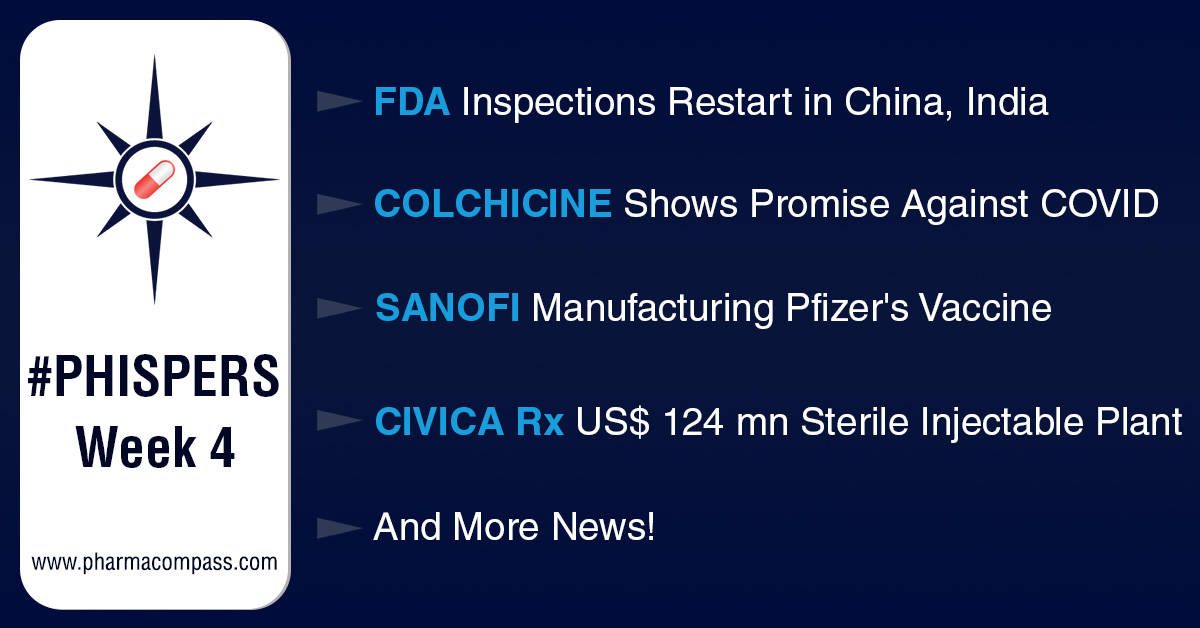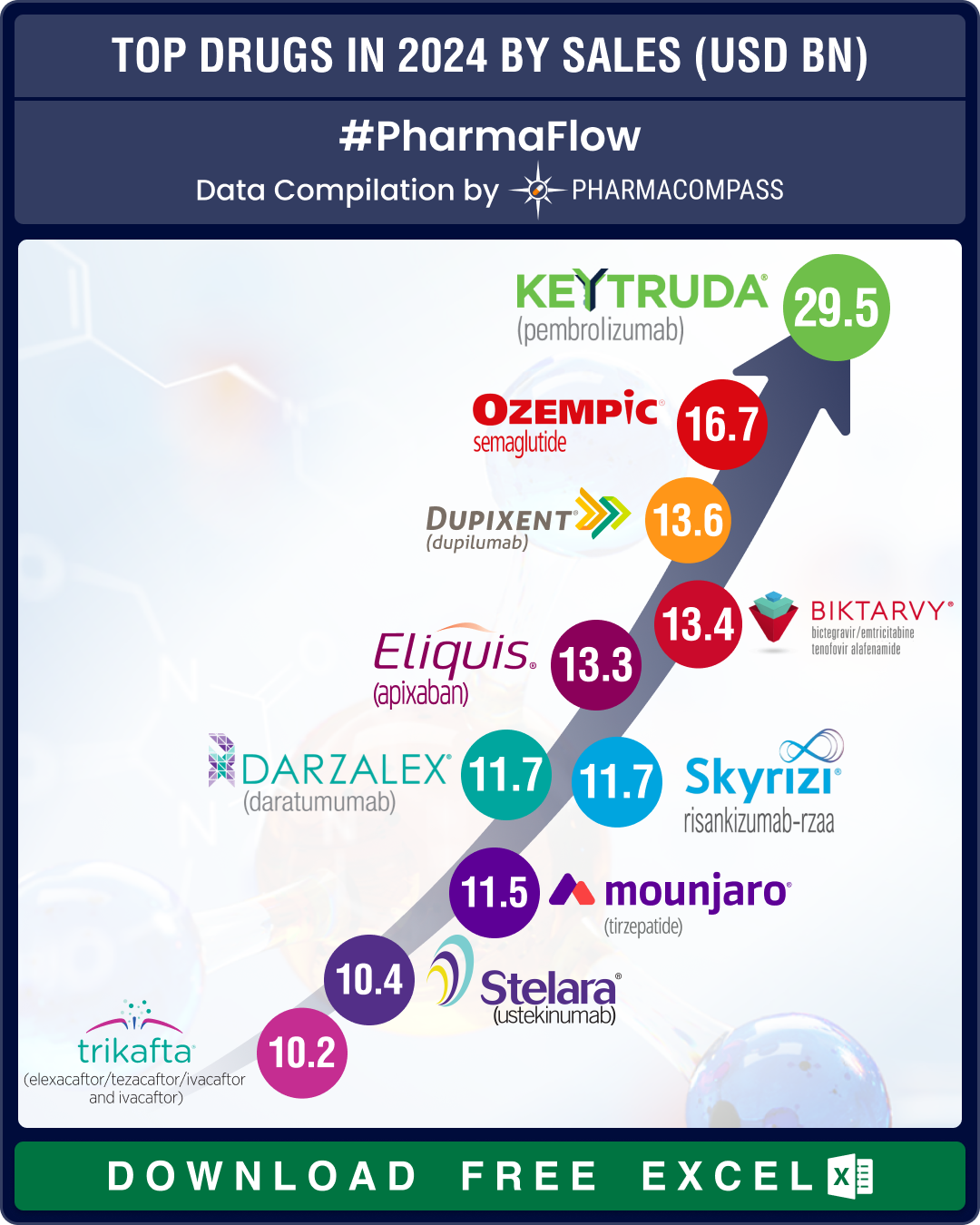
By PharmaCompass
2021-01-28
Impressions: 1880
This week, Phispers brings you news from the US Food and Drug Administration, as the agency starts conducting prioritized inspections in China and India.
In Covid-19 news, Pfizer and Moderna said they are working on developing a booster shot that will protect against the new variants of SARS-CoV-2.
With Europe facing delays and delivery cuts of Covid-19 vaccines from AstraZeneca and Pfizer, Sanofi has offered to produce more than 100 million doses of Pfizer-BioNTech’s messenger RNA vaccine by the end of the year.
And a centuries old gout drug Colchicine has shown promise in treating Covid-19.
FDA starts prioritized inspections in China, India; CDER meets its user fee commitments
The US Food and Drugs Administration (FDA) had halted all physical inspections last year due to the coronavirus pandemic. Now, the agency is resuming inspections in China and India in a bid to keep drug approvals on schedule.
According to a tweet by Patrizia Cavazzoni, the acting director of FDA’s Center for Drug Evaluation and Research (CDER), inspections deemed “mission critical” are still being conducted by the agency. “FDA has begun conducting prioritized inspections by investigator staff in China and is planning to initiate prioritized inspections in India shortly,” she said on Twitter.
According to other tweets, Indian drugmaker Alembic Pharmaceutical Limited’s Karakhadi plant in Gujarat will be inspected this week by two to three FDA auditors.
Though inspections were down in 2020, CDER met its user fee commitments, a report published on the Regulatory Affairs Professionals Society (RAPS) website said.
“While continuing to conduct mission-critical and prioritized inspections, due to practical constraints, such as travel limitations, quarantine and social distancing requirements or lockdowns, we have been increasingly relying on inspection alternatives,” wrote the FDA. These include reviewing historical compliance data for the facility in question, relying on information from “trusted foreign regulatory partners” once appropriate confidentiality agreements are in place, requesting facility records, and conducting drug sampling at the US border.
According to the report, across all approval types, the number of cases where pre-approval inspections by the FDA were skipped in favor of alternative approaches rose from 48 percent in July-September (third quarter) 2020 to 60 percent by October-December (fourth quarter).
For obligations under the Generic Drug User Fee Amendments (GDUFA), CDER met goal dates during the third quarter of 2020 for 94 percent of original applications, 98 percent of original applications with imminent approval, and for 99 percent of both prior approval supplements (PAS) and PAS with imminent approval. In the fourth quarter, those figures dropped slightly across the board. In all, CDER approved 31 original abbreviated new drug applications (ANDAs) for drugs or biologics used to treat patients with Covid-19, 17 in the third and 14 in the fourth quarter of 2020.
Centuries old gout drug Colchicine shows promise in treating Covid
A press release from a Canadian research group has raised hopes that a centuries old generic drug used to treat gout — Colchicine — can treat people recently diagnosed with Covid-19 and reduce the risk of hospitalization.
Colchicine is a treatment for gout that has been in use for centuries. It is the treatment of choice for familial Mediterranean fever and amyloidosis (an associated complication).
In the press release, which was issued last week, the Montreal Heart Institute (MHI) said as per the findings of the COLCORONA study, the rate of hospitalization or death was 21 percent lower among patients who received colchicine compared to those who were randomly assigned a placebo. The study enrolled 4,488 patients.
The press release says “colchicine is the only effective oral medication for treating non-hospitalized patients.”
“Our research shows the efficacy of colchicine treatment in preventing the ‘cytokine storm’ phenomenon and reducing the complications associated with Covid-19,” said Jean-Claude Tardif, Director of the MHI Research Center, Professor of Medicine at the Université de Montréal and Principal Investigator of the COLCORONA trial. “We are pleased to offer the first oral medication in the world whose use could have a significant impact on public health and potentially prevent Covid-19 complications for millions of patients.”
However, several experts said the data provided in the press release was too limited to draw any conclusions. They also discussed the risks of conducting science via press releases, instead of relying on detailed manuscripts in peer-reviewed journals.
“The result is believable but it’s so vague — and we don’t have a lot of the details — that it’s very hard to know how to interpret it,” said Steven Nissen, a cardiologist at the Cleveland Clinic.
Nahid Bhadelia, an infectious diseases physician at Boston University, said she needed to see the data — and that she dislikes science by press release. “We have to see the data, but it fits the picture that SARS-CoV-2 leads to some sort of innate immunity dysfunction.”
Pfizer, Moderna working on booster shots that protect against Covid-19 variants
The emergence of new variants in Britain, South Africa and Brazil has created concern that mutations in the novel coronavirus may make vaccines less effective.
With the rise in new variants of SARS-CoV-2, both Pfizer-BioNTech and Moderna are working towards developing a booster shot that will protect against these Covid-19 variants.
Pfizer said this week that along with its partner BioNTech, the company is developing a booster shot to protect against Covid-19 variants.
In a news release, Moderna said it found no reduction in the antibody response against the variant found in Britain. However, it found a reduced response against the South African variant. Though the company said it believes its vaccine will work against new variants found in Britain and South Africa, it will test a new booster shot aimed at the South African variant of the coronavirus after concluding that the antibody response could be diminished.
Moderna is looking at whether a booster shot — either of its existing vaccine or of a new shot designed to protect against the South African variant — could be made available in the future if evidence were to emerge that protection had declined.
Moderna also said it expects that its current vaccine will remain protective for at least a year after completing the two-dose course. It does not expect to test a third dose until at least six months after that course is finished.
Meanwhile, Eli Lilly said its monoclonal antibody prevented Covid-19 infections in nursing home residents and staff, in a clinical trial. This is the first time that such a treatment has been shown to prevent infection. Lilly released the results in a press release, although it said it would publish the data in a research paper very soon. Lilly believes its antibody could be an option not just to treat Covid-19, but to help prevent it in limited circumstances.
Merck ends development of two Covid jabs: This week, Merck & Co said it will stop development of its two Covid-19 vaccines and focus pandemic research on treatments, with initial data on an experimental oral antiviral expected by March-end.
Merck has said in early trials, both its vaccines generated immune responses that were inferior to those seen in people who had recovered from Covid-19 as well as those reported for other Covid-19 vaccines. Merck was late to join the Covid vaccine bandwagon. The announcement comes a month after Sanofi and GlaxoSmithKline delayed launch of their shot to late 2021.
Sanofi to produce 100 million doses of Pfizer’s jab as EU faces delays, delivery cuts
In Europe, the enthusiasm over Covid-19 vaccines got diminished by talk of protectionism and hoarding. Vaccine roll-outs in the European Union have been slow when compared with countries in other regions. Last week, AstraZeneca said it will cut supplies to the European Union in the first quarter of this year. According to a senior EU official, this move on AstraZeneca’s part means a 60 percent reduction to 31 million doses for the bloc. Similarly, Pfizer said there will be a temporary impact on shipments in late January to early February.
But there is help coming in from French drugmaker Sanofi — the company said it will produce over 100 million doses of the Covid-19 vaccine developed by its competitors Pfizer and BioNTech by 2021-end. In an interview, Sanofi’s CEO Paul Hudson said the company decided to approach Pfizer in order to be helpful. The two companies have reached an agreement on the matter.
This week, EU also urged drug companies to honor their commitments to supply Covid vaccines, as delivery cuts and delays dim hopes of a quick fix to Covid-19. The Latvian foreign affairs minister Edgars Rinkevics said EU member states could take AstraZeneca to court for a breach of supply contracts, if the company does not honor the Covid-19 vaccine delivery schedule.
“Europe invested billions to help develop the world’s first Covid-19 vaccines. To create a truly global common good,” European Commission President Ursula von der Leyen said at a virtual meeting of the World Economic Forum. “And now, the companies must deliver. They must honor their obligations,” she added.
Vaccine shortages are not limited to the EU. Brazil is waiting for ingredients from China to locally manufacture two vaccines — one from China’s Sinovac Biotech, and the other from AstraZeneca.
Meanwhile, Australia has approved the Pfizer-BioNTech Covid-19 vaccine for use but warned that AstraZeneca’s international production problems mean the country will need to distribute a locally manufactured shot earlier than planned.
Pfizer had told the Australian government it anticipated continuous supply but would provide global production guidance “in mid-February for March and beyond on a weekly basis,” he said.
Not-for-profit Civica Rx to invest US$ 124 million in sterile injectables plant
Back in September 2019, several major hospital groups in the US had got together to launch their own generic drug company — christened Civica Rx — to tackle chronic drug shortages and high prices.
Last week, there was news that the non-profit generic drug manufacturer Civica Rx will invest US$ 124.5 million to build its first in-house manufacturing operation in Petersburg, Virginia.
The new facility will employ over 180 people and will produce sterile injectable medications used in hospitals for Covid-19 patient care, emergency room and intensive-care unit treatments, surgeries, and to treat other serious conditions.
Construction has already started on the 120,000-square-foot plant, which should be up and running within the next three years. The facility will ultimately produce 90 million vials and 50 million pre-filled syringes per year.
Civica is a key collaborator in the US government-funded partnership with Phlow Corp, Medicines for All Institute at Virginia Commonwealth University and AMPAC Fine Chemicals. In May, the Trump administration had doled out a hefty four-year, US$ 354 million contract to Phlow Corporation to reduce US dependence on foreign drug production.
Meanwhile, Japanese drugmaker Shionogi has sold exclusive development and marketing rights of its Covid-19 drug to US biotech BioAge Labs, Inc. The American biotech company plans to start a Phase 2 trial of the drug for Covid-19 in the first half of 2021. Shionogi is also developing a recombinant protein vaccine for Covid-19 that is now in combined Phase 1 and 2 trials in Japan.
The PharmaCompass Newsletter – Sign Up, Stay Ahead
Feedback, help us to improve. Click here
Image Credit : Phisper Infographic by SCORR MARKETING & PharmaCompass is licensed under CC BY 2.0
“ The article is based on the information available in public and which the author believes to be true. The author is not disseminating any information, which the author believes or knows, is confidential or in conflict with the privacy of any person. The views expressed or information supplied through this article is mere opinion and observation of the author. The author does not intend to defame, insult or, cause loss or damage to anyone, in any manner, through this article.”








